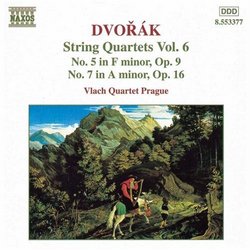| All Artists: Antonin Dvorak, Vlach Quartet Prague Title: Dvorák: String Quartets Vol. 6 (Nos. 5 & 7) Members Wishing: 0 Total Copies: 0 Label: Naxos Release Date: 9/28/1999 Genre: Classical Styles: Chamber Music, Symphonies Number of Discs: 1 SwapaCD Credits: 1 UPC: 730099437721 |
Search - Antonin Dvorak, Vlach Quartet Prague :: Dvorák: String Quartets Vol. 6 (Nos. 5 & 7)
 | Antonin Dvorak, Vlach Quartet Prague Dvorák: String Quartets Vol. 6 (Nos. 5 & 7) Genre: Classical
|
Larger Image |
CD Details |
CD ReviewsGreat performances of underplayed early gems R. Ashley | New Jersey | 05/20/2000 (5 out of 5 stars) "Like all of the Dvorak recordings by the Vlach, these are warmly played, well recorded, and conveniently priced. These two quartets (the first of which contains the famous "Romance") are stylistically similar to the 2nd and 3rd Symphonies. They are a good example of Dvorak's early style at its best. There is no shortage of melodic inspiration, and his quartet writing in general is already in very fine form.The music is played with great affection and the recording quality could not be better. I would recommend all the Vlach recordings, but this one especially stands out because these works needed to be recorded." Very good playing of fine, if not top-drawer Dvorak G.D. | Norway | 04/26/2009 (4 out of 5 stars) "Dvorak's f minor quartet op. 9 was written in 1873 and is thus contemporaneous with e.g. The Heirs of the White Mountain and The King and the Charcoal-Burner, i.e. the period in which the influence of Wagner was strong on his music. It was first performed in 1930, but Dvorak used material from the slow movement for his Romance for violin and orchestra. It is not a masterpiece but is still a worthwhile work. The slow introduction to the first movement provides the material for the movement and it is skillfully elaborated and developed but ultimately not particularly distinguished. The lyrical slow movement, however, is very fine, with a beautifully gentle theme (introduced by the first violin over a plucked notes of the cello accompaniment). The slightly syncopated tempo di valse is rather fine as well, and the last movement, with a distinctly Slavonic flavor, is atmospheric but a little stodgy.
The op. 16 quartet from 1874 has a classically structured and again skillfully developed first movement based on slightly more distinguished material than the previous quartet, and an inventive, tonally somewhat ambiguous second movement. The capricious scherzo is mature Dvorak, however, and the ferocious dynamic leaps of the finale based on a rhythmic triple figure with a rather charming melodic contrast makes for a rather exciting summing up. The performers of the Vlach quartet are excellent advocates for this interesting but hardly great music, providing spry, energetic readings with warmth and nuance. The sound quality is again first-class, and while this is hardly the place to sample the cycle, it is firmly recommended, especially to those who are already following the series." |

 Track Listings (8) - Disc #1
Track Listings (8) - Disc #1